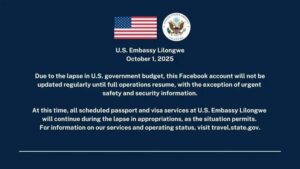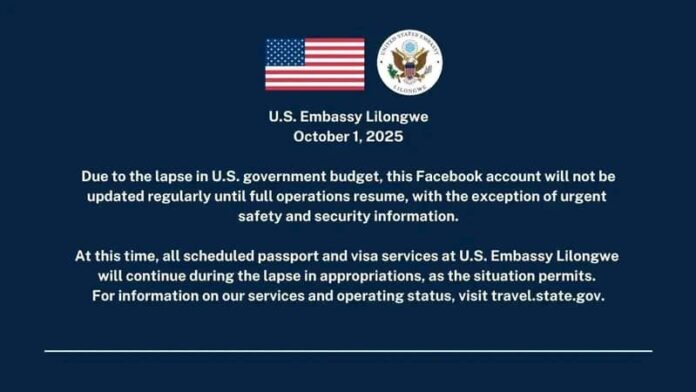By Burnett Munthali
The United States Embassy in Lilongwe has announced that it will not update its Facebook page regularly until the ongoing budget lapse in Washington is resolved.
A government shutdown occurs when the US Congress fails to pass a budget to fund federal agencies, creating disruptions in normal operations both at home and abroad.
In a post dated October 1, 2025, the embassy informed the public that its Facebook account will remain largely inactive.

The embassy emphasized that the only exceptions will be posts carrying “urgent safety and security information,” ensuring that critical updates still reach American citizens and the wider public in Malawi.
The announcement comes at a time when political gridlock in the United States has once again led to uncertainty in federal operations, raising concerns about the impact on diplomatic missions and the services they provide.
Despite the reduced online activity, the embassy reassured Malawians and Americans living in the country that essential consular services will continue.
Reads the embassy’s message: “At this time, all scheduled passport and visa services at US Embassy Lilongwe will continue during the lapse in appropriations, as the situation permits.”
This means that applications for visas, passport renewals, and other vital services will still be processed, though the embassy cautioned that unforeseen developments in Washington could affect operations.
The decision to scale back social media updates underscores how deeply budgetary disputes in the US Congress ripple across the world, even affecting embassies thousands of miles away.
For Malawians, the embassy’s statement is a reminder of the interconnectedness of global governance, where domestic challenges in one nation can have immediate effects on another.
The embassy also sought to reassure the public that it remains committed to safeguarding the welfare of both American citizens in Malawi and Malawians engaging with US services.
As Washington struggles to break its budget deadlock, the scaled-back communication from the US Embassy in Lilongwe highlights the global implications of political paralysis in the world’s largest economy.
This is not the first time that diplomatic missions in Africa have felt the effects of a US government shutdown.
In 2013, during a 16-day shutdown under President Barack Obama, many US embassies across the continent reduced non-essential activities, limiting cultural exchanges and delaying some development assistance programs.
In 2018 and early 2019, the United States experienced its longest-ever government shutdown, lasting 35 days under President Donald Trump, which disrupted grant disbursements and slowed aid programs in countries such as Kenya, Uganda, and Malawi.
Although essential services like visa issuance were maintained as long as funding permitted, embassies were forced to prioritize emergency functions and scale back engagement in areas such as education initiatives, public diplomacy, and technical support to African governments.
For Malawi, where the United States has long been a critical partner in health programs, agriculture, and governance reforms, such disruptions serve as reminders of how dependent bilateral projects can be on stable funding decisions in Washington.
The suspension or delay of development funding during past shutdowns sometimes caused uncertainty for local implementing partners, particularly in areas supported by USAID.
This history illustrates the vulnerability of African nations to political stalemates in the United States, despite being far removed from Capitol Hill debates.
As Malawi waits for Washington to resolve the current budget standoff, the embassy’s reduced communication is both a precautionary measure and a symbol of how far-reaching the consequences of US domestic politics can be.
For now, the embassy’s promise to maintain consular services provides reassurance, but the episode raises larger questions about resilience, dependency, and the global costs of political deadlock in America.



